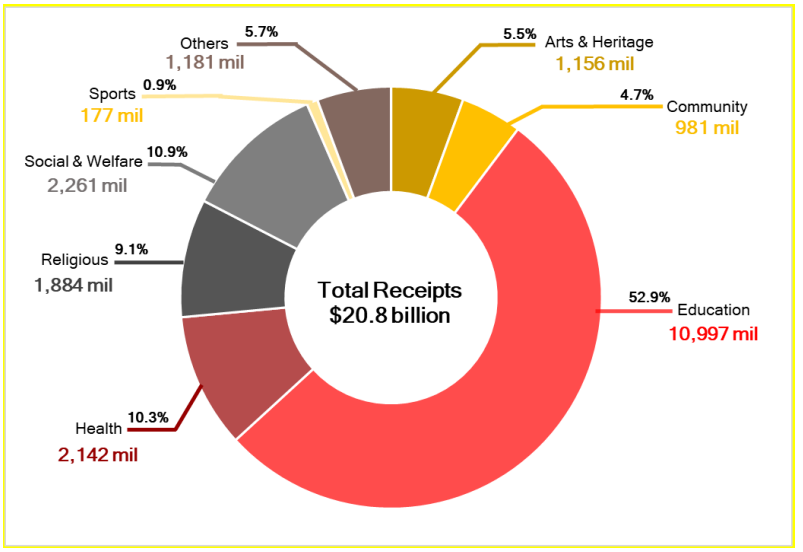5 Critical gaps in caring for vulnerable seniors in Singapore


Singapore is fast reaching superaged status. Life expectancy is going up while the birth rate is heading south. By 2030 – not many years from where we are today – one in four Singaporeans will be 65 years or older. More worryingly, a fifth of that cohort will be over 80 (Population in Brief 2021).
Ageing well and quality of life are huge concerns for our elderly. The biggest challenges centre on health: physical frailty or disability, sensory impairment such as hearing loss, or chronic conditions such as dementia or diabetes. However, ageing is not just a matter of biophysical health. It is also about bolstering psychological, emotional and community support.
Mental wellness issues, such as depression and loneliness, are a real threat to the older demographic. On top of this, many older Singaporeans worry about financial security, due to escalating care costs, inadequate retirement income and limited earning opportunities.
Many people prefer to age at home but that too has its challenges. In this article, we highlight the critical gaps in caring for vulnerable seniors and what can be done to support them so that ageing can be enabling, empowering and meaningful.
#1 Funding rising healthcare needs
Singapore’s healthcare expenses could jump tenfold between 2016 and 2030 to over $66 billion [1]. Family is typically the first line of support but families are getting smaller and relationships may be estranged. Income caps also mean not everyone qualifies for government aid.
Even when fees are subsidized, low-income seniors may struggle with costs. Women, in particular, face more financial insecurity as they tend to have interrupted employment or be in low-wage or unpaid care work. Women also tend to outlive men and are more likely to be single, widowed or divorced in old age.
The burden lands on welfare organisations to meet the shortfall. However, causes that help the elderly don’t attract as much funding as say, education, which in Singapore receives the lion’s share of donations: in 2019, they accounted for 52.9% of total receipts of $20.8 billion (Commissioner of Charities 2020).
#2 Access to home care and assisted living
Letting people age at home or in the community and delaying institutional care is a universal goal. But as the number of seniors with mobility issues or age-related ailments increases, demand for home nursing, home therapy, meal deliveries, assistive devices and home safety and modification services (to prevent falls) will rise. There will also be a much bigger role for centre-based eldercare, such as day care, and initiatives for assisted living.
#3 Depression and suicide
Aside from physical ill health, many seniors grapple with loneliness, loss of loved ones or dependence on others. The number of elderly living alone doubled to 63,800 in 2020 from a decade ago and is set to hit 83,000 by 2030 (Singapore Department of Statistics).
According to the Samaritans of Singapore, the number of people aged 60 and above who took their own lives reached a high at 154 deaths in 2020. That’s a 26% increase from the year before and is the highest elderly suicide death rate since 1991[2]. There is an urgent need to support charities that connect with seniors, organise social outings or wellness activities for them, offer intergenerational bonding or assist beneficiaries with their healthcare needs such as medical appointments and screenings.
#4 Dementia support
Dementia is our nation’s most prevalent neurodegenerative disease today, affecting one in 10 seniors. By 2030, the number of dementia patients is set to reach 92,000 – a doubling from 2015 (Dementia in the Asia Pacific Region). Dementia additionally imposes a huge burden on caregivers, many of whom are ageing themselves. We need more funding to support early diagnosis and intervention, community dementia care services such as exercise and cognitive activities as well as training and support for caregivers.
#5 End of life care
Discussions about death or end of life remain taboo. There is insufficient advance care planning as well as a lack of healthcare workers and expertise in the palliative care system. Better awareness and improved options for inpatient, home or day care hospice services are needed.
How CFS helps you do more with your giving
If you would like to help seniors who have fallen through the cracks or would like to make ageing more empowering and inclusive, we at CFS can align your giving goals with the needs of this community. We are a cause-neutral organisation that supports grantmaking to a wide range of charitable areas in Singapore. Of the 400-plus charities we evaluate and make grants to, close to 30% work with seniors. We partner with charities that focus on clearly identified problem areas or social gaps that are under-supported. Charities must also demonstrate measurable outcomes and good stewardship of funds.
A simple and cost-effective way to contribute to a variety of causes in Singapore is by setting up a Donor-Advised Fund (DAF). A DAF can be set up by an individual, a beneficiary of a will, a trust, or a family office. CFS will handle all fund administration and leverage our unparalleled insight into Singapore’s charitable landscape to provide philanthropy advice that ensures your giving is targeted, accountable and impactful. CFS strives to ensure that every grant that goes out creates positive change.
As a donor, you will save on legal expenses and enjoy upfront tax deductions at the prevailing rate on eligible donations. Donors will also receive regular statements tracking incoming donations to the DAF and outgoing disbursements to charities. CFS has an established track record when it comes to setting up DAFs and our DAF payout rates outperformed the entire US DAF industry by 12% and their community foundations by 2 times.
If you would like to begin your giving journey with CFS, get in touch with us.
This article was written by Sunita Sue Leng, a former financial analyst and journalist, who believes that the written word can be a force for good. She hopes to someday write something worth plagiarising.
[1] AsiaOne. (2016). Elderly Health Costs Rise Tenfold 2030 Report
Singapore is fast reaching superaged status. Life expectancy is going up while the birth rate is heading south. By 2030 – not many years from where we are today – one in four Singaporeans will be 65 years or older. More worryingly, a fifth of that cohort will be over 80 (Population in Brief 2021).
Ageing well and quality of life are huge concerns for our elderly. The biggest challenges centre on health: physical frailty or disability, sensory impairment such as hearing loss, or chronic conditions such as dementia or diabetes. However, ageing is not just a matter of biophysical health. It is also about bolstering psychological, emotional and community support.
Mental wellness issues, such as depression and loneliness, are a real threat to the older demographic. On top of this, many older Singaporeans worry about financial security, due to escalating care costs, inadequate retirement income and limited earning opportunities.
Many people prefer to age at home but that too has its challenges. In this article, we highlight the critical gaps in caring for vulnerable seniors and what can be done to support them so that ageing can be enabling, empowering and meaningful.
#1 Funding rising healthcare needs
Singapore’s healthcare expenses could jump tenfold between 2016 and 2030 to over $66 billion [1]. Family is typically the first line of support but families are getting smaller and relationships may be estranged. Income caps also mean not everyone qualifies for government aid.
Even when fees are subsidized, low-income seniors may struggle with costs. Women, in particular, face more financial insecurity as they tend to have interrupted employment or be in low-wage or unpaid care work. Women also tend to outlive men and are more likely to be single, widowed or divorced in old age.
The burden lands on welfare organisations to meet the shortfall. However, causes that help the elderly don’t attract as much funding as say, education, which in Singapore receives the lion’s share of donations: in 2019, they accounted for 52.9% of total receipts of $20.8 billion (Commissioner of Charities 2020).
#2 Access to home care and assisted living
Letting people age at home or in the community and delaying institutional care is a universal goal. But as the number of seniors with mobility issues or age-related ailments increases, demand for home nursing, home therapy, meal deliveries, assistive devices and home safety and modification services (to prevent falls) will rise. There will also be a much bigger role for centre-based eldercare, such as day care, and initiatives for assisted living.
#3 Depression and suicide
Aside from physical ill health, many seniors grapple with loneliness, loss of loved ones or dependence on others. The number of elderly living alone doubled to 63,800 in 2020 from a decade ago and is set to hit 83,000 by 2030 (Singapore Department of Statistics).
According to the Samaritans of Singapore, the number of people aged 60 and above who took their own lives reached a high at 154 deaths in 2020. That’s a 26% increase from the year before and is the highest elderly suicide death rate since 1991[2]. There is an urgent need to support charities that connect with seniors, organise social outings or wellness activities for them, offer intergenerational bonding or assist beneficiaries with their healthcare needs such as medical appointments and screenings.
#4 Dementia support
Dementia is our nation’s most prevalent neurodegenerative disease today, affecting one in 10 seniors. By 2030, the number of dementia patients is set to reach 92,000 – a doubling from 2015 (Dementia in the Asia Pacific Region). Dementia additionally imposes a huge burden on caregivers, many of whom are ageing themselves. We need more funding to support early diagnosis and intervention, community dementia care services such as exercise and cognitive activities as well as training and support for caregivers.
#5 End of life care
Discussions about death or end of life remain taboo. There is insufficient advance care planning as well as a lack of healthcare workers and expertise in the palliative care system. Better awareness and improved options for inpatient, home or day care hospice services are needed.
How CFS helps you do more with your giving
If you would like to help seniors who have fallen through the cracks or would like to make ageing more empowering and inclusive, we at CFS can align your giving goals with the needs of this community. We are a cause-neutral organisation that supports grantmaking to a wide range of charitable areas in Singapore. Of the 400-plus charities we evaluate and make grants to, close to 30% work with seniors. We partner with charities that focus on clearly identified problem areas or social gaps that are under-supported. Charities must also demonstrate measurable outcomes and good stewardship of funds.
A simple and cost-effective way to contribute to a variety of causes in Singapore is by setting up a Donor-Advised Fund (DAF). A DAF can be set up by an individual, a beneficiary of a will, a trust, or a family office. CFS will handle all fund administration and leverage our unparalleled insight into Singapore’s charitable landscape to provide philanthropy advice that ensures your giving is targeted, accountable and impactful. CFS strives to ensure that every grant that goes out creates positive change.
As a donor, you will save on legal expenses and enjoy upfront tax deductions at the prevailing rate on eligible donations. Donors will also receive regular statements tracking incoming donations to the DAF and outgoing disbursements to charities. CFS has an established track record when it comes to setting up DAFs and our DAF payout rates outperformed the entire US DAF industry by 12% and their community foundations by 2 times.
If you would like to begin your giving journey with CFS, get in touch with us.
This article was written by Sunita Sue Leng, a former financial analyst and journalist, who believes that the written word can be a force for good. She hopes to someday write something worth plagiarising.
[1] AsiaOne. (2016). Elderly Health Costs Rise Tenfold 2030 Report
- Related Topics For You: AGEING WELL, CAREGIVER SUPPORT, CHARITY STORIES, DONOR STORIES, DONOR-ADVISED FUND, FAMILIES, HEALTH, LEAVING WITH DIGNITY, MENTAL WELLBEING, OPINION, PERSONS WITH DISABILITIES, PROMOTING HEALTHCARE, SENIORS




